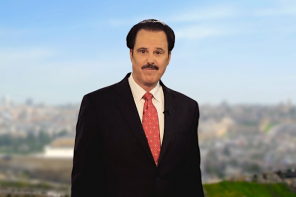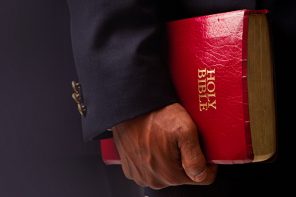In early April, before the Pennsylvania primary, the Obama campaign appointed a Catholic National Advisory Council—made up of elected officials, scholars, and activists and co-chaired by Pennsylvania Sen. Bob Casey, Kansas Gov. Kathleen Sebelius, Virginia Gov. Tim Kaine and several others—to reach out to Catholic voters. Less than a month later, Bill Donohue, the president of the conservative Catholic League for Religious and Civil Rights (and a notorious opponent of progressive causes) called on the Obama campaign to dissolve the Council because its members were “dissenters” from the Catholic Church.
Apart from this archaic-sounding claim, Donohue insisted that, “not one of the 26 former and current public policy holders who constitute the group stand with the Catholic Church on all three major issues: abortion, embryonic stem cell research and school vouchers.”
Several of the Council’s advisory Board members responded to Donohue by pointing out that while they viewed abortion as a “profound moral issue,” they felt it was not the only issue of concern to voters.
In early June, Donohue issued another statement declaring victory over the Council, saying that it appeared that his “initial recommendation—to dissolve the group—may have been accepted.” Donohue triumphantly pointed out that
There is no mention anywhere on the Obama website of the Catholic National Advisory Council, and after plac[ing] three phone calls to his campaign … we were told … that someone would get back to us, but no one did.” Donohue noted that he “personally e-mailed [Mark] Linton [Obama’s National Catholic Outreach Coordinator] informing him of the three phone calls, requesting that he respond to my question: ‘I would like to know whether the Catholic National Advisory Council for Sen. Obama is still operative.’ He has not replied.
Donohue’s statement continued:
It would appear, then, that the group no longer exists. It is not hard to understand why. After being criticized by the Catholic League, Archbishop Joseph Naumann of Kansas City rebuked one of Obama’s Catholic advisers, Kansas Governor Kathleen Sebelius: she was instructed not to present herself for Holy Communion (she is a rabid defender of abortion). At about the same time, radical Chicago priest Rev. Michael Pfleger bailed on Obama by withdrawing his name from the Advisory Council. Now we find that there is no listing for the group on the Obama website.
As of this writing, the status of Obama’s Catholic National Advisory Council is unclear. (Phone calls to Obama headquarters were not returned.) However, the dust-up between the always vociferous Donohue and the Obama campaign was reminiscent of the battles that took place during the 2004 presidential campaign when a group of conservative Catholics and neoconservatives were joined by conservative Christian evangelicals in attacking the Catholic authenticity of the Democratic Party’s Sen. John Kerry. The clash gives a foretaste of the heated battles that will likely be waged over the Catholic vote between now and the November election.
In their book The Catholic Vote: A Guide for the Perplexed (Orbis Books, 2008), Clarke E. Cochran and David Carroll Cochran, both political scientists, pointed out that divisions within the Catholic community has made it more difficult for Catholic voters to discern among candidates: “Levels of misunderstanding and acrimony between Catholics and Protestants have greatly diminished, but have greatly increased between Catholic and Catholic!”
These conflicts include disagreements “over the Mass (stand or kneel; Latin or English; contemporary or traditional music), battles over the role of women in the church, strife about contraception and attitudes toward homosexuality, and many other issues produce angry exchanges between ‘liberal’ and ‘conservative,’ ‘progressive’ and ‘Orthodox’ Catholics.”
Ultimately, these clashes often shed more heat than light, and have led to a situation where “some Catholics come perilously close to writing other Catholics out of the faith because of their political opinions.”
Catholic Vote Up For Grabs
According to a Gallup Poll released on June 26, Barack Obama is “holding a narrow 47% to 43% advantage over John McCain,” among Catholic voters, the slimmest lead that either candidate has amongst religious groups. The polling was conducted June 5-23, after Hillary Clinton ended her presidential run.
According to the Gallup website, Hispanic Catholics may be a key to Obama winning the Catholic vote: “In these data, roughly one in seven Catholic registered voters report being of Hispanic ethnicity, and they prefer Obama by a 66% to 25% margin. Among non-Hispanic Catholics, McCain has a 46% to 43% advantage.”
“For much of the 20th century, American Catholics were loyal Democrats, but in recent elections their voting patterns have been largely indistinguishable from the general population,” Religion News Service’s Jeff Diamant pointed out in a post-November 2006 election analysis. “And for the last quarter-century, conservative Catholics and white evangelicals have increasingly voted Republican, making opposition to abortion and same-sex marriage their top political issues.”
In the 2000 presidential election, Democratic presidential candidate Al Gore won a small majority of Catholic voters over George W. Bush. Four years later, while the Gallup poll, exit polls and the American National Election Studies project disagreed on which way the Catholic vote had gone, it was clear Bush had closed the gap. The turnaround was in part due to a Republican Party project specifically aimed at courting Catholic voters.
GOP organizers, together with longtime conservative and neoconservative Catholics, brought the “traditional family values” mantra to the table, highlighting the supposed agreement between Catholics and conservative evangelical Christians on two major issues; abortion and same-sex marriage.
In the congressional elections of 2006, however, there was a notable shift as Catholic voters moved back towards Democrats by a 55 percent to 45 percent margin, according to National Election Pool exit polls.
In this year’s race between the Democratic Party’s Sen. Barack Obama and the Republican Party’s Sen. John McCain, it appears that Catholic voters will once again up for grabs.
A recent study by Georgetown University’s The Center for Applied Research in the Apostolate (CARA) found that if Catholics—about 47 million potential voters—stick with their current party, Obama will have an 8 million vote edge over McCain.
The same study found that “a majority” of Catholic voters aren’t affiliated with either political party, which leaves approximately 19.5 million voters to be courted. CARA also found that Catholic voters’ attitudes had shifted dramatically on issues such as the use of military force and tax increases for the wealthiest Americans, between 2002 and 2006.
Over the past several weeks, while McCain has been dodging evangelical Christians (most notably Pastors John Hagee and Rod Parsley, after spending time and energy courting their endorsements), Obama has been actively courting both Christian evangelical and Catholic voters. (Hagee’s negative remarks about the Catholic Church caused the pastor to be rebuked by the Catholic League’s Bill Donohue and Hagee’s apology was later accepted by Donohue.)
Earlier this month, Obama held a closed-door meeting with nearly 40 Christian leaders, including the Rev. Franklin Graham, son of evangelist Billy Graham, publishing magnate Stephen Strang, Rev. Samuel Rodriguez, president of the 15 million-member National Hispanic Christian Leadership Conference, and mega church pastor Bishop T.D. Jakes. And, the Obama campaign has bigger plans. According to a Religion News Service report, Team Obama “is also launching a grassroots effort, tentatively called Joshua Generation, with plans to hold concerts and house meetings targeted at young evangelicals and Catholics.”
David O’Brien, the Loyola professor of Catholic studies at the College of the Holy Cross and a member of the steering committee of Obama’s Catholic National Advisory Council, and Lisa Sowle Cahill, a professor of theology at Boston College and a former president of the Catholic Theological Society of America, recently wrote a piece distributed by Religion News Service titled “Don’t play politics with Communion.” O’Brien and Cahill wrote about two Catholic Obama endorsers Kansas Gov. Sebelius and Douglas W. Kmiec, an esteemed constitutional law professor at Pepperdine University, who were “recent targets of clergy who use Communion as a political weapon and effectively blacklist respected Catholic leaders.”
It remains to be seen just how bitter the battle will get over the Catholic vote. For now, O’Brien and Cahill are asking “Catholics and all Americans to speak out against this spiritual McCarthyism.”




